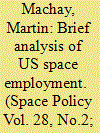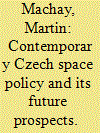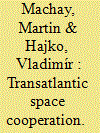| Srl | Item |
| 1 |
ID:
113041


|
|
|
|
|
| Publication |
2012.
|
| Summary/Abstract |
Space policy is an area of industrial economic policy. The space economy would vanish without the active role of the state. Although space may appear exotic to economist, it is not impossible to provide a quick economic insight into one of the most important aspects of all economic activities - the people employed. The space industry can attract employees from other industries in two ways. First, according to individual preferences and motivations. Second, on the basis of higher wages. Statistical evidence suggests the latter is more common. Moreover wages do not reflect productivity. NASA employees earn much more than employees in law or medicine. This does not match the social importance of these activities. Space employs many more people that stated by the OECD. Taking all activities together space employs almost half a million people in the USA. $1 billion given to NASA creates up to 24 000 vacancies in the space industry and also provides room for another 40 000 in the space economy in the long run. Current changes to the US national space programme suggest a decrease of $1.6 billion per year, implying a loss of up to 39 000 jobs.
|
|
|
|
|
|
|
|
|
|
|
|
|
|
|
|
| 2 |
ID:
107707


|
|
|
| 3 |
ID:
124930


|
|
|
|
|
| Publication |
2013.
|
| Summary/Abstract |
A standard microeconomic tool is used to analyze quantitative data to reveal the attitudes of European states toward space exploration and exploitation. The contemporary economic crisis uncovers the real political priorities. The tool used helps us to distinguish between three policy types: activist, active, and passive. Words can radically differ from real actions of governments, as is shown in this article. Results indicate that there is a relatively strong core of supporting states of space exploration and exploitation in the middle of the European continent.
|
|
|
|
|
|
|
|
|
|
|
|
|
|
|
|
| 4 |
ID:
142104


|
|
|
|
|
| Summary/Abstract |
This article explores economic factors that help to explain Congressional support for NASA Authorization Acts and issues of U.S. federal space funding. Three economic factors related to political opportunism are identified and discussed in detail. Across the board, NASA Centers are a significant factor in shaping voting preferences, suggesting that the NASA presence itself plays an important role in influencing legislators. Meanwhile, other forms of economic opportunism based on the relative importance of the space and aircraft manufacturing industries in a given state and the amounts of NASA procurements are factors, but only in a more limited sense. This supports the concept that economic opportunism does influence legislative voting behavior on NASA Authorization Acts, though the bulk of the impact appears to be indirectly via NASA centers.
|
|
|
|
|
|
|
|
|
|
|
|
|
|
|
|
| 5 |
ID:
142558


|
|
|
|
|
| Summary/Abstract |
After the Cold War ended in the disintegration of the Soviet Union, the space race was not the factor behind the space exploration and exploitation anymore. The aim of this paper is to analyze the transatlantic space cooperation between the USA (more specifically NASA) and the ESA. The cooperation can be driven by two major motives – economic and political. The empirical evidence suggests that while ESA is motivated by the economic one NASA is motivated by the political one. ESA is seemingly on NASA's tail but it benefits economically.
|
|
|
|
|
|
|
|
|
|
|
|
|
|
|
|